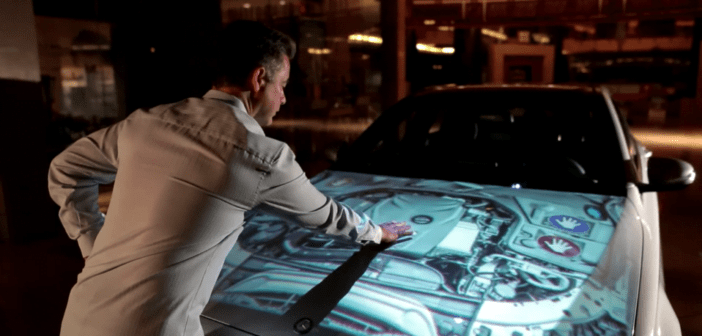Walmart, Coca-Cola and Mercedes Benz are using Post Mobile AR to give customers a more interactive in-store experience.
Dallas-based spatial experience company Spacee has come up with a technology that can deliver an AR experience that doesn’t require a phones, tablet, glasses or any other type wearable to operate.
By transforming any 2D or 3D surface into an interactive touchscreen, the company provides an interactive playground that’s as fun as it is convenient. It’s changing how in-store products are displayed, and how customers are able to interact with them by merging the physical world and the digital world.
The technology is called Post Mobile AR, and companies such as Walmart, Coca Cola, and Supershoes are already on board with Spacee’s technology, with more brands expected to jump on board later this year.
Mercedes Benz used Spacee’s platform to deliver their Touch Car Experience, which can be used to project strategically-placed digital images to the hood of the car. Users are then free to walk up the vehicle and touch the surface to unlock key information and animations, as well as interact with various other digital content.
Another partnership with Taylor Brands has customers exploring custom suits through an interactive window displays on Madison Ave in New York City. Custom storefront windows provide an intuitive shopping experience without even having to even step inside the store.
Spacee will be the first to tell you that what they are offering is not the same as something like Microsoft HoloLens, Leap Motion, or Magic Leap technology. Instead of relying on personal devices such as smartphones or headsets, Post Mobile AR allows you to walk up and immediately engage in a 100% computer vision-based AR experience.

Spacee developed Post Mobile AR with the vision of delivering a unique in-store marketing experiences similar to that of mobile AR shopping apps.
During an interview with VRScout, Spacee CEO, Skip Howard said, “If you just stick to what you’re doing then there’s no reason for people to go shopping – online is always cheaper,” he continues, “if you don’t create an experience that customers want to be a part of, your store could close and you won’t have a job.”
What is really impressive about Post Mobile AR is that since it is completely digital, it doesn’t need actual products to run demos.

Spacee partnered with Walmart to help them create an interactive Nest thermostat in-store display for several of their stores. Spacee printed a 3D mockup of the thermostat that looked like a white hockey puck before using their tech to create a digital version of the Nest thermostat and merge the two. This meant that you were able to get a feel of what it was like to use a Nest device without actually touching the live product.
Since you’re not using the real product, there’s nothing to steal other than the 3D mockup. And even if someone stole the mockup, you can still run the AR experience seeing as it’s 100% digital.

Walmart CEO, Doug McMillon, was so impressed with this that he called Spacee’s technology “the future of shopping” in a Facebook post.
Howard explains, “Our technology can save a company millions of dollars because you can’t steal what’s not there,” adding, “there is no shrinkage, no security devices needed, no need to replace a stolen device, no labor and cost involved for fixing and setting up, or planogram compliance issues.”
Since Spacee first debuted their Post Mobile AR, the technology has evolved to include Ai as well. The computer is able to detect if an object such as a handbag is on the display, and instead of freezing up the experience, the Ai is able to make it part of the experience.
Spacee has big plans for their tech beyond in-store displays and retail. Entertainment, real estate, and theme parks are just a few of the markets on their radar, with the company constantly on the look out for even more avenues of expansion.
Skip Howard thinks AR should be easy, allowing users to jump right into an AR experience without having to pull out a phone or wear a headset.
I think most of us can agree on that.





